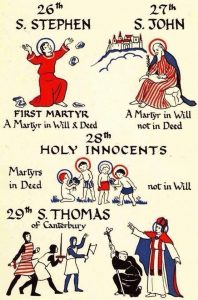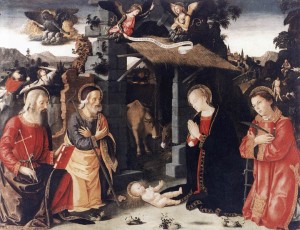Tag: Christmas
St Stephen
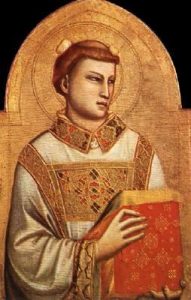 The Second Day of Christmas gives us a rather unique liturgical memorial: the death of the first martyr, Saint Stephen. Today’s saint is renown for his singular devotion to the Lord through adoration and service; he believed the unity of truth of the Good News given by Jesus; Stephen is recalled by the Church as being a deacon (see the Acts).
The Second Day of Christmas gives us a rather unique liturgical memorial: the death of the first martyr, Saint Stephen. Today’s saint is renown for his singular devotion to the Lord through adoration and service; he believed the unity of truth of the Good News given by Jesus; Stephen is recalled by the Church as being a deacon (see the Acts).
What is revealed to us in sacred Scripture is that Stephen became the first Christian to be killed for his faith in Jesus Christ. A predicted outcome by the Lord. Persecution was received as a consequence to living the intensity life and holiness proposed the Lord Jesus. The Church recognized that persecution as a clear sign that one is on the right path: if you follow in Jesus’ footsteps, you will meet the same fate He did. Saint Stephen gave his witness to Jesus and the Truth of the Gospel, but Stephen’s executions didn’t accept his testimony.
The Acts of the Apostles reveals that they “stopped their ears and rushed upon him” (7:57). What does stopped their ears mean? They would not listen to the reasonableness of the Good News. Convicted by truth, Stephen didn’t compromise and thus fulfilled the prophetic utterance that we read about in today’s Gospel. Historically, it was Saul as a young man, full of zeal for something other than holiness; Saul, later Paul, helped the executioners stone Stephen to death. Remarkably, Stephen died praying for his murderers.
Are we convicted by the Truth of the Incarnation? Can we follow and do what Saint Stephen did?
Joyfully celebrate the coming of our salvation
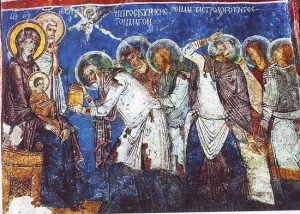 A Christmas sermon by Saint Augustine of Hippo
A Christmas sermon by Saint Augustine of Hippo
Awake, mankind! For your sake God has become man. Awake, you who sleep, rise up from the dead, and Christ will enlighten you. I tell you again: for your sake, God became man.
You would have suffered eternal death, had he not been born in time. Never would you have been freed from sinful flesh, had he not taken on himself the likeness of sinful flesh. You would have suffered everlasting unhappiness, had it not been for this mercy. You would never have returned to life, had he not shared your death. You would have been lost if he had not hastened to your aid. You would have perished, had he not come.
Let us then joyfully celebrate the coming of our salvation and redemption. Let us celebrate the festive day on which he who is the great and eternal day came from the great and endless day of eternity into our own short day of time.
For this reason, when our Lord was born of the Virgin, the message of the angelic voices was: Glory to God in the highest, and peace to his people on earth.
For what greater grace could God have made to dawn on us than to make his only Son become the son of man, so that a son of man might in his turn become the son of God?
Ask if this were merited; ask for its reason, for its justification, and see whether you will find any other answer but sheer grace.
The Only Begotten Son of God
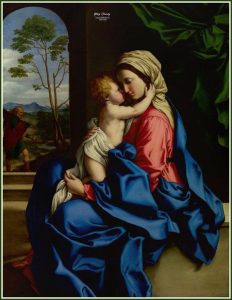 “What worthy return can we make for so great a condescension? The One Only-begotten God, ineffably born of God, entered the Virgin’s womb and grew and took the frame of poor humanity. He who upholds the universe, within whom and through whom are all things, was brought forth by common childbirth. He at whose voice archangels and angels tremble, and heaven and earth and all the elements of this world are melted, was heard in childish wailing. The Invisible and Incomprehensible, whom sight and feeling and touch cannot measure, was wrapped in a cradle.”
“What worthy return can we make for so great a condescension? The One Only-begotten God, ineffably born of God, entered the Virgin’s womb and grew and took the frame of poor humanity. He who upholds the universe, within whom and through whom are all things, was brought forth by common childbirth. He at whose voice archangels and angels tremble, and heaven and earth and all the elements of this world are melted, was heard in childish wailing. The Invisible and Incomprehensible, whom sight and feeling and touch cannot measure, was wrapped in a cradle.”
— St. Hilary of Poitiers, Bishop and Doctor of the Church (300-368 AD)
Our Advent observance
The scriptures tell us that there is a time and season for everything, for each particular event. There is a time of preparing for Christmas, and that is Advent, and then there is a time for Christmas itself. There is no doubt in my mind that the more serious we are about our personal Advent journey, the greater the joy we shall reap during our Christmas celebration.
It is a good practice to make concrete plans on how best to keep our Advent observance. Often, if no plans are made in advance, much of Advent goes unnoticed and wasted. Since Advent is basically a quiet time of waiting for the arrival of the Light at Christmas, it is good to start by trying to become more internally quiet during this rather brief season.
Above all, we must make the most of these moments of stillness by remaining calm, silent, and spending quality time with the Lord. The words from one of the psalms counsel us: Be still, and know that I am God. Monks always strive to preserve a more quiet recollected spirit during these lovely Advent days and thus enjoy the Lord’s intimate company.
There is no reason why others, in a monastery or elsewhere, could not do the same wherever they are. It is a question of resolving to do so and making the effort. The Holy Spirit will do the rest. Come, Holy Spirit.
A Monastery Journey To Christmas
Br. Victor-Antoine D’Avila-Latourrette, OSB
Holy Innocents
 The Christmas Octave has an unique way to keep the memory of Christ and His Way alive with the saints honored in these days: today, we celebrate the Feast of the Holy Innocents. As it is revealed in Scripture, King Herod felt threatened by the birth of the Infant King. He ordered the death of every male child of Bethlehem to preserve his own reign (cf. Matthew 2:16). Mother Church honors the multitude of child-martyrs because of the Presence of Jesus. Our theology teaches us that the infant voices eternally sing triumphant praises to the King of Kings, Lord of Lords: the Light of the World.
The Christmas Octave has an unique way to keep the memory of Christ and His Way alive with the saints honored in these days: today, we celebrate the Feast of the Holy Innocents. As it is revealed in Scripture, King Herod felt threatened by the birth of the Infant King. He ordered the death of every male child of Bethlehem to preserve his own reign (cf. Matthew 2:16). Mother Church honors the multitude of child-martyrs because of the Presence of Jesus. Our theology teaches us that the infant voices eternally sing triumphant praises to the King of Kings, Lord of Lords: the Light of the World.
Here is a poem, “The Holy Innocents” by Laurence Housman
When Christ was born in Bethlehem,
Fair peace on earth to bring,
In lowly state of love He came
To be the children’s King.
And round Him, then, a holy band
Of children blest was born,
Fair guardians of His throne to stand
Attendant night and morn.
And unto them this grace was giv’n
A Saviour’s name to own,
And die for Him Who out of Heav’n
Had found on earth a throne.
O blessèd babes of Bethlehem,
Who died to save our King,
Ye share the martyrs’ diadem,
And in their anthem sing!
Your lips, on earth that never spake,
Now sound th’eternal word;
And in the courts of love ye make
Your children’s voices heard.
Lord Jesus Christ, eternal Child,
Make Thou our childhood Thine;
That we with Thee the meek and mild
May share the love divine.
Rejoice, O mystical rod of Jesse
“Rejoice, O mystical rod which blossomed the unfading Flower.”
(excerpt from the Akathist Hymn to the Theotokos)
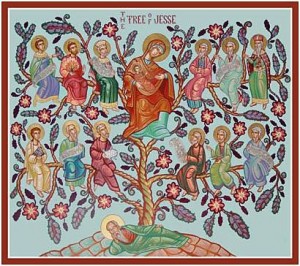 The genealogy of Jesus is very interesting and impressive for a variety of reasons. The Gospel of Saint Luke traces Jesus’ ancestry back from Joseph to Adam to show His connection to the inception of humanity; the Gospel of Saint Matthew begins his genealogy with Abraham –the Father of the Hebrew Nation– and moves forward, linking Him to the kingly line of David. Both strains of lineage demonstrate, therefore, that Jesus is the fulfillment of all Old Testament prophecies because He is a direct descendent of King David, the rightful heir to be the new “King of Israel.”
The genealogy of Jesus is very interesting and impressive for a variety of reasons. The Gospel of Saint Luke traces Jesus’ ancestry back from Joseph to Adam to show His connection to the inception of humanity; the Gospel of Saint Matthew begins his genealogy with Abraham –the Father of the Hebrew Nation– and moves forward, linking Him to the kingly line of David. Both strains of lineage demonstrate, therefore, that Jesus is the fulfillment of all Old Testament prophecies because He is a direct descendent of King David, the rightful heir to be the new “King of Israel.”
This, too, was prophesied by Isaiah who proclaimed that, “There shall come forth a shoot from the stump of Jesse, and a branch shall grow out of his roots. And the Spirit of the Lord shall rest upon Him” (Is. 11:1-2); Jesse is the father of King David.
God fulfills His promise. The icon presented here depicts mystical “root” often depicts the Virgin Mary in the center of a vine of the historic forefathers presents to the world the blossomed Fruit or Flower, Jesus, seated upon her throne-like lap.
Today, is a time to contemplate the Promise made Flesh in the birth of our Lord and Savior! For it is “Jesus who brought the fire of the Spirit, which takes away the desire for the things that are here, and removes us to another love” (Saint John Chrysostom).
Blessed Christmas
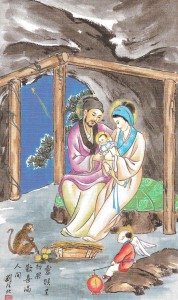 Puer natus est nobis, et filius datus est nobis, cuius imperium super humerum eius, et vocabitur nomen eius magni consilii Angelus.
Puer natus est nobis, et filius datus est nobis, cuius imperium super humerum eius, et vocabitur nomen eius magni consilii Angelus.
A Child is born for us, and a son is given to us; his scepter of power rests upon his shoulder, and his name will be called Messenger of great counsel.
Here’s a thought from St. Augustine: “Let us all together then, perfectly united in mind and heart, celebrate today the birthday of the Lord…. In the one who for our sake sprang up from the earth, let us in turn take possession of heaven.”
Mutual prayers!
Saint Stephen
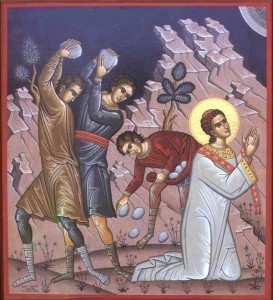 Saint Peter Damian thus begins his Sermon for this Feast: “We are holding in our arms the Son of the Virgin, and are honoring, with our caresses, this our Infant God. The holy Virgin has led us to the dear Crib. The most beautiful of the Daughters of men has brought us to the most beautiful among the Sons of men, [Ps. xliv. 3.] and the Blessed among women to Him that is Blessed above all. She tell us … that now the veils of prophecy are drawn aside, and the counsel of God is accomplished. … Is there anything capable of distracting us from this sweet Birth? On what else shall we fix our eyes? … Lo! whilst Jesus is permitting us thus to caress him; whilst he is overwhelming us with the greatness of these mysteries, and our hearts are riveted in admiration – there comes before us Stephen full of grace and fortitude, doing great wonders and signs among the people. [Acts, vi. 8.] Is it right, that we turn from our King, to look on Stephen, his soldier? No – unless the King himself bid us do so. This our King, who is Son of the King, rises … to assist at the glorious combat of his servant. … Let us go with him, and contemplate this standard-bearer of the Martyrs.”
Saint Peter Damian thus begins his Sermon for this Feast: “We are holding in our arms the Son of the Virgin, and are honoring, with our caresses, this our Infant God. The holy Virgin has led us to the dear Crib. The most beautiful of the Daughters of men has brought us to the most beautiful among the Sons of men, [Ps. xliv. 3.] and the Blessed among women to Him that is Blessed above all. She tell us … that now the veils of prophecy are drawn aside, and the counsel of God is accomplished. … Is there anything capable of distracting us from this sweet Birth? On what else shall we fix our eyes? … Lo! whilst Jesus is permitting us thus to caress him; whilst he is overwhelming us with the greatness of these mysteries, and our hearts are riveted in admiration – there comes before us Stephen full of grace and fortitude, doing great wonders and signs among the people. [Acts, vi. 8.] Is it right, that we turn from our King, to look on Stephen, his soldier? No – unless the King himself bid us do so. This our King, who is Son of the King, rises … to assist at the glorious combat of his servant. … Let us go with him, and contemplate this standard-bearer of the Martyrs.”
Quoted by Dom Prosper Gueranger
Peering into the Mystery of the Incarnation
The Lord your God is in your midst, a mighty Savior; He will rejoice over you with gladness, and renew you in his love. He will sing joyfully because of you, as one sings at festivals. (Zeph. 3: 14-18a)
I find myself at this time of year, with this feast, what does it mean that God has entered into my very circumstance. At leach of the Masses I genuflected at the part where the Incarnation was professed and wondered how at this moment there is a keen recognition of what the difference Jesus makes in world, among friends and enemies, indeed, all of life. A friend of mine said that Christmas reminds the baptized Christian that the Incarnation provides us the opportunity to know that God looks like us (but doesn’t act like us); God know the very circumstance of living. I spent so much time at the Christmas Masses wondering quietly —and aloud— about the fact of God’s gaze upon us through the Birth of His Son, Jesus. Asking myself, how is that God loves me so much that he peers into my existence in 2014? But, it is also how I peer into what God has so wonderfully done…
I think it is a true statement to say that Christmas is, more than any Christian celebration, a way to know that God is really in our midst. (Pascha has its own theological experience and data!) As my friend also said, “God’s involvement in our lives as the Word made Flesh, as Christ the Lord, as a real human being means that there is nothing in our lives that God cannot understand from personal experience.”
This sermon of the great Saint Augustine of Hippo helps me to consider anew what I profess to believe and to sharpen witness. Perhaps your meditation today and during the Octave will benefit from this sermon:
My mouth shall speak the praise of the Lord…by whom all things were made and who was made [flesh] amid all the works of His hands; who is the Manifestor of His Father, the Creator of His Mother; Son of God born of the Father without a mother, Son of Man born of a mother without a father; the great Day of the angels, small in the day of men; the Word as God existing before all time, the Word as flesh existing only for an allotted time; the Creator of the sun created under the light of the sun; ordering all ages from the bosom of His Father, from the womb of His Mother consecrating this day; remaining there, yet proceeding hither; Maker of heaven and earth brought forth on this earth overshadowed by the heavens; unspeakably wise, wisely speechless; filling the whole world, lying in a manger; guiding the stars, a nursling at the breast; though insignificant in the form of man, so great in the form of God that His greatness was not lessened by His insignificance nor was His smallness crushed by His might. When He assumed human form He did not abandon His divine operations… When clothed in the weakness of our flesh He was received, not imprisoned, in the Virgin’s womb so that without the Food of Wisdom being withdrawn from the angels we might taste how sweet is the Lord.
Why do we marvel at these conflicting powers of the Word of God when the discourse which I utter is apprehended so freely by the senses that the hearer receives it, yet does not confine it? If it were not received, it would give no instruction; if it were confined, it would not reach others. In spite of the fact that this discourse is divided into words and syllables…you all hear the whole discourse and each individual takes in the whole. While speaking, I do not fear that one listener may, by hearing me, grasp the whole discourse so that his neighbor can get nothing of it…Nor is this hearing accomplished at successive periods of time so that, after the dis- course which is being delivered has come to you first, it leaves you so that it may go to another person. No, it comes to all at the same time and the whole discourse is apprehended by each individual…How much more readily, then, would the Word of God, through whom all things were made and who, remaining in Himself, renews all things, who is neither confined by places nor restrained by time, neither changed by long or short intervals of time, neither adorned by speech nor terminated by silence, be able to make fertile the womb of His Mother when He assumed human flesh, yet not leave the bosom of His Father; to make His way hither for human eyes to gaze upon Him, and still to enlighten angelic minds; to come down to this earth while rul- ing the heavens; to become Man here while creating men there?
Let no one believe, then, that the Son of God was changed into the Son of Man; rather, let us believe that, with the perfect preservation of His divine nature and the perfect assumption of human nature, He, remaining the Son of God, became also the Son of Man. For the fact that the Scriptures say ‘The Word was God’ and ‘The Word was made flesh’ (Jn 1.1,14) does not mean that the Word became flesh in such a way as to cease to be God since, because the Word was made flesh, in that same flesh Emmanuel ‘God with us’ was born. …the word which we form within us becomes an utterance when we bring it forth from our mouth: the word is not changed into the utterance, but the voice by which it comes forth is taken on while the inner word remains un-changed; what is thought remains within, what is heard sounds forth. Nevertheless, the same thing is expressed in sound which had previously been expressed in silence…when the word becomes an utterance, it is not changed into this utterance, but remains in the light of the mind; having taken on the voice of the flesh, it reaches the listener without leaving the thinker…Both that which is considered in the mind, however, and that which sounds forth in speech are variable and diverse; the thought will not remain when you have forgotten it, nor will the utterance remain when you are silent. But the Word of the Lord remains forever and remains unchanged.
From Sermon 187: The Feast of the Nativity
